
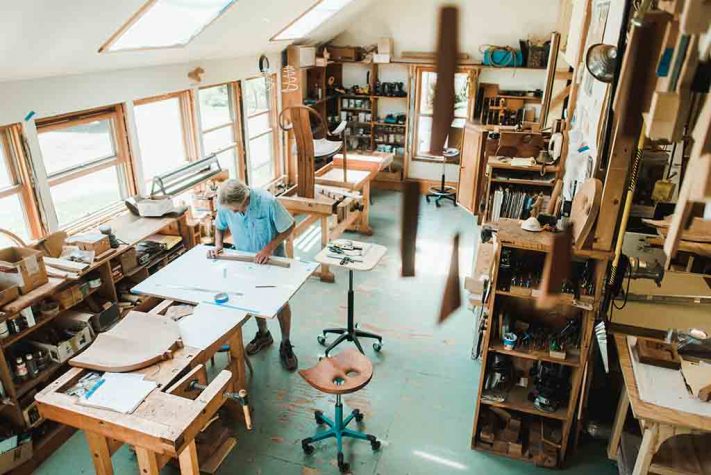
Sitting Pretty
Stools for focus and rockers for lounging, designed in Stonington and made to last
By Katy Kelleher, photo by Christina Wnek
Geoff Warner had been daydreaming about the rocking chair for decades. He knew, he says, that a rocker would be part of his artistic legacy someday; he just didn’t know when. The Stonington-based furniture designer kept getting distracted by more pressing projects and tasks. Like meeting with other craftspeople, starting a business, filling orders of Owl stools, and running workshops. He’d revisit the rocking chair idea every now and again, but it wasn’t until 2019 that he finally carved out the time to create a prototype. “I didn’t have time to do mock-ups,” he says. “A furniture show was coming up. I had to focus. I had to block out everything else that was in my head.” Warner had a deadline. He gave himself two days to complete the chair. Two days without anyone else, two days of music (Grateful Dead, Beatles, whatever happened to be on WERU) and hot tea and late nights and early mornings. “I had to get some sleep because I can’t do all-nighters anymore,” he explains. “But it was really intense.”
July, 2017


Love your back!
Furniture maker strives for beauty, health and comfort
By Kathryn Cawdrey
The fresh smell of wood shavings and light scent of tung oil filled the airy ground-floor workshop at Geoffrey Warner Studio in Stonington. The pleasant fragrances embody the fine furniture-making that goes on there. Stonington may be best known as the Maine port that lands the most lobster. But it’s also associated with famed artists, coffee-roasting and Owl Stools, among other things. Read more …
Fall, 2016
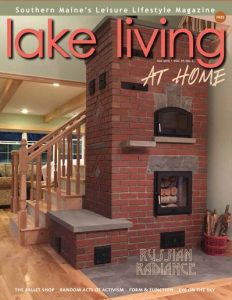
FORM & FUNCTION
by Laurie LaMountain
During an end-of-day phone conversation with Lake Living designer Dianne Lewis this past April, I happened to mention that my back was bothering me from too much time seated in front of the computer. Well aware of the complete lack of ergonomic benefit from the chair I was then using, she said I should look into getting an Owl Stool. Intrigued, I brought up the Web site and within minutes made the bold move of ordering one.
Fall, 2016

Serendipity Leads to Revolutionary Ergonomic Design
by Geoffrey Warner
As a furniture designer living and working in a small fishing village in downeast Maine back in 2009, I was working on a solution for surviving a faltering economy when serendipity struck. I wanted to create a comfortable stool where I was not constantly aware of pressure on my sitting bones (ischial tuberosities), so I began dabbling with removing material from a wooden seat in my shop. Before long, I had removed so much that two prominent holes appeared. The holes looked like eyes that made the seat look like the head of an owl. Read more …
November 2nd, 2015

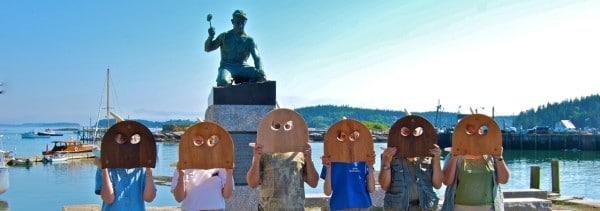
Holes in seat help Maine-made Owl Stools take off
byAbigail Curtis, Bangor Daily News Staff
“STONINGTON, Maine — Every craftsman wants to find the product that strikes a chord with customers and seems to take on a life of its own.
Fine furniture maker Geoffrey Warner of Stonington has found that dream product — an ergonomically designed wooden stool that has been endorsed by health professionals as easing back pain, and happens to look cute to boot. He ships them all over the country and to places including Canada, Europe and Australia. But it all began with the economic slowdown that hit Maine artisans and craftsmen hard in 2008 and 2009.” (read more)
August 2015

GOT YOUR BACK: Furniture designer Geoffrey Warner’s curious-looking little stool is easy on bottom and spine.
by Arielle Greenberg Bywater, photographs by Erin Little, Down East Magazine
“If you had driven down the Blue Hill Peninsula 10 years ago, over the winding two-lane road edged with stones, past the mist-covered yards stacked with neon-bright lobster traps, all the way to Stonington, at the southern end of Deer Isle, you might have happened upon Geoffrey Warner happily making one-of-a-kind wood furniture in his roadside gallery. Built on commission, his sinuous dining chairs and bold, live-edge coffee tables were shipped to wealthy clients in Philadelphia and New York as new orders rolled in by word of mouth.” (read more)
Spring/Summer 2015

Wood Doctor
“Five years ago Geoffrey Warner 77PH channeled his RISD hero Tage Frid in designing a sustainable, ergonomically therapeutic hardwood stool that can be used for hours-without feeling it in the ‘sit bones.’ The Owl Stool and the next-generation Pro Owl-made to meet the needs of healthcare professionals-now form the backbone of Owl Furniture, an offshoot of Warner’s primary design/build studio in Stonington, ME. ‘I love seeing how the Owl has provided such comfort and relief for so many,’ says the self-described ‘wood doctor.’” (read more)
October 24, 2012

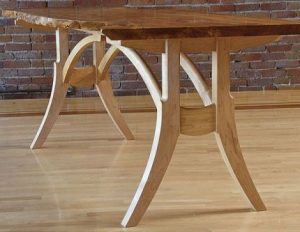
Reader’s Gallery: Warner Olive Desk
“Geoffrey Warner was inspired by George Nakashima’s use of live-edge slabs with simple, rectilinear bases. But Warner went in a different direction, designing curvy bases that celebrate a joiner’s flair for structure. From Fine Woodworking #222.” (read more)
June 2012
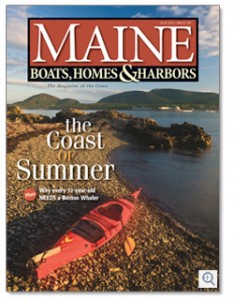
More Than Meets the Eyes
Geoffrey Warner designed the Owl Stool and shows others how to build it.
by Marie Malin
“The stool really does look like an owl. With a half-oval seat featuring two big ‘eye’ holes and a bill-like ridge down the center-the figuring of the wood lending a brooding expression- master craftsman Geoffrey Warner’s signature piece, the Owl Stool, is no ordinary-looking piece of furniture.” (read more)
December 2011
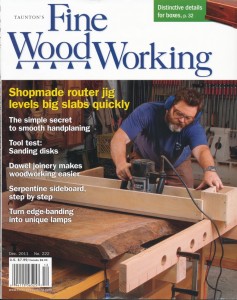
How They Did It
Sturdy yet sprightly base for a thick top
by Jonathan Binzen
“The bases Geoffrey Warner designed for his tables (see the back cover) have to work visually with the life-edge tops, but they also have to be powerfully built to support slabs weighting hundreds of pounds.” (read more)
September 30, 2011

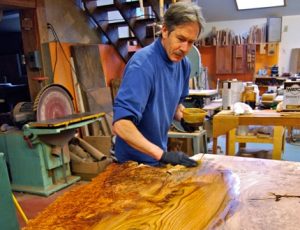
Geoffrey Warner: Assembling a Life
by Jon Binzen
“Geoffrey Warner spent a year after college working for a luthier in Maine. Warner loved music and loved making things with wood, but he soon found the constraints of making musical instruments too confining. He soon made his way into furniture making and after working on his own for a while he had the good fortune to catch Tage Frid in his last year as a teacher at Rhode Island School of Design.”
